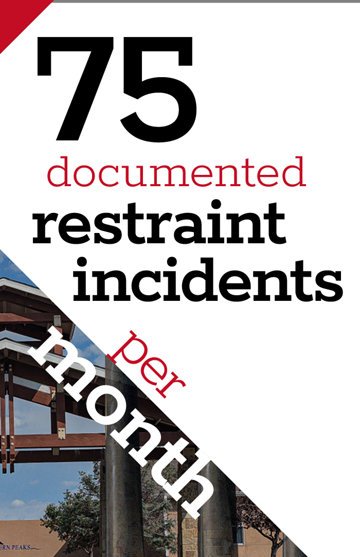“Let me out. I didn’t know it was this bad.” —Youth Resident, Southern Peaks Regional Treatment Center
What exactly that “treatment” consists of was laid bare in a report by Disability Law Colorado (DLC), a nonprofit advocacy organization.
“Unsafe” is one of the delicate adjectives used in the report to describe conditions at SPRTC. “Often unkind” is the phrase used to characterize the staff, who, according to various children, will say things to them like, “you suck” and “you’re a piece of crap.”
One child said he was told to “go kill myself.”
Name-calling is one thing, but physical abuse in the form of excessive restraints and coercive “therapy” is another.
“SPRTC continues to be more broadly known for their use of restraints rather than treatment.”
The case of Brandy Fogle’s autistic 13-year-old son appears to be a typical one. Fogle, who has been at the facility since January, is restrained multiple times weekly, for up to one hour and 20 minutes. “I can’t imagine,” Ms. Fogle said, “being held down by four to five adults for a few minutes, let alone an hour and 20 minutes.”
The brutality inflicted on her son is among the roughly 75 documented restraint incidents per month at SPRTC as of May 2025—a rate significantly higher than other comparable facilities in Colorado.

The cruel use of restraints is mirrored in the facility’s unsafe conditions and its striking lack of care and compassion. “We have had numerous children report to us that they have received raw or undercooked food, including raw chicken,” says DLC. “Multiple children have reported getting food poisoning while in the care of SPRTC.”
And as for the housing, it “cannot be described as feeling homelike,” the report discloses. “Children have metal beds and dark rooms with breakable windows. Their common areas are filled with furniture that is often found in correctional settings like jails and prisons. This furniture is even less homelike and welcoming than the furniture in juvenile corrections facilities in Colorado.”
Or as one child expressed, “It’s like jail.”
SPRTC claimed to have set up a Youth Advisory Council to allow for feedback from residents about the facility, but when the DLC visited, there was no such council.
What SPRTC does have that other facilities don’t is police activity. Lots of it. Between January and August 9, 2025, there were 324 calls from the facility to the Cañon City PD.
“Some children have gone as far as cutting themselves, drinking cleaning fluid, and hanging themselves from trees in the courtyard to get staff’s attention and try to get out of SPRTC,” DLC says.
Each of these desperate acts underscores the barbaric conditions that Disability Law Colorado has documented in its eight monitoring visits over the past three years.
Following visits, DLC has issued reports, engaged in dialogue and made recommendations concerning the facility’s hard-wired habit of treating children as items to be stored and restrained rather than helped and cared for. And each time promises were made and changes instituted that have not been sustained.
Small wonder that, in DLC’s words, “SPRTC continues to be more broadly known for their use of restraints rather than treatment.”
Small wonder that, as one frustrated child’s legal advocate put it, “Southern Peaks feels more like a warehouse.”
Small wonder that the children imprisoned at SPRTC feel trapped and unheard.
Author Maya Angelou said, “When someone shows you who they are, believe them the first time.”
Those running Southern Peaks Regional Treatment Center have shown us again and again who they are.
It’s time to believe them—and act accordingly.






















